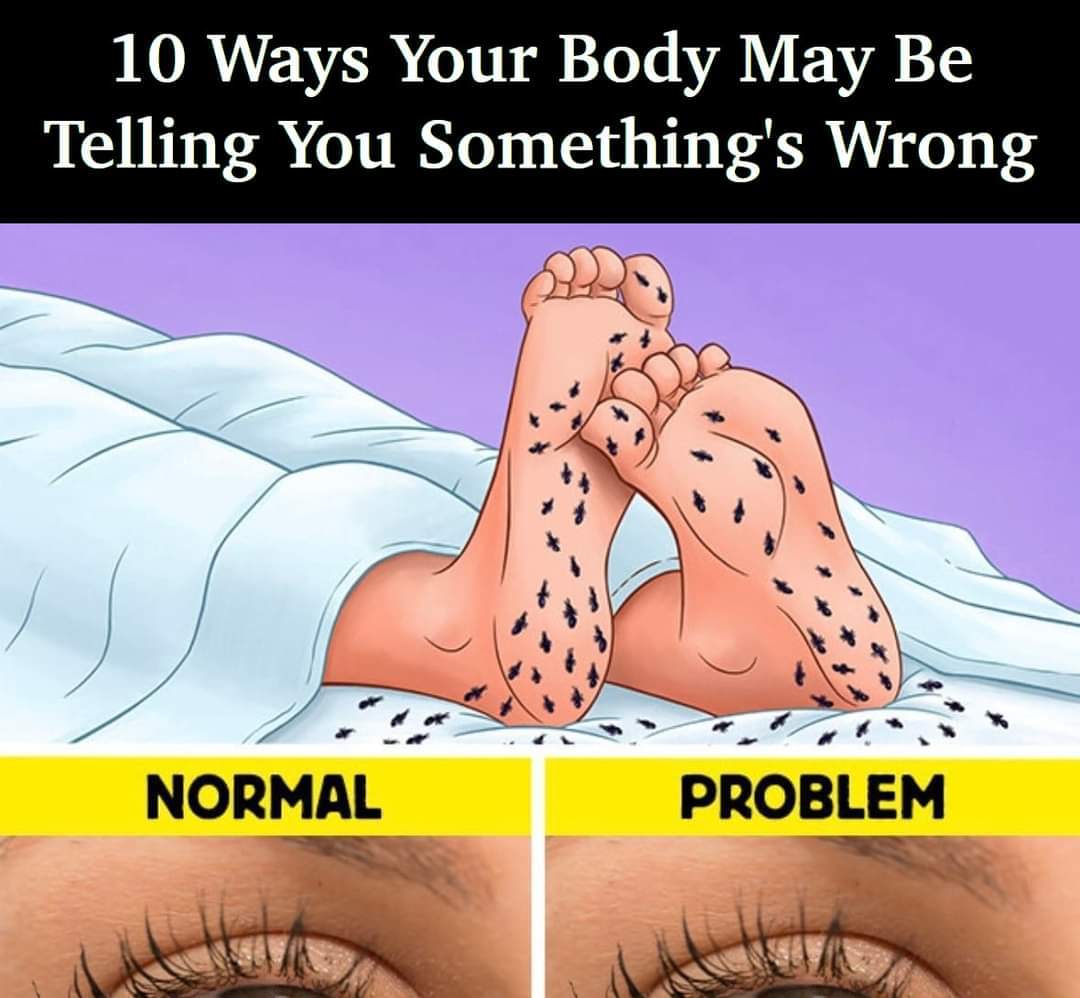Your body is an incredible communicator, constantly sending signals to let you know when something isn’t quite right. While some signs are obvious, like a fever during an infection or a sore throat when you catch a cold, others are far more subtle. These quiet warnings often go unnoticed, yet they can signal underlying health conditions that may become serious if left unchecked. Whether it’s a persistent craving, an odd sensation, or an unexpected change in your skin, these small indicators should never be ignored. Paying attention to them can mean the difference between catching a health problem early or dealing with more severe complications later. Here are ten subtle ways your body might be telling you something is wrong, and what you can do about it.

One of the first signals to watch for is a crawling or achy sensation in your legs, especially at night or when you’re at rest. This could be a sign of Restless Leg Syndrome (RLS), also known as Willis-Ekbom Disease. RLS often feels like a creeping, itching, or throbbing sensation in the legs, accompanied by an uncontrollable urge to move them. While it’s not life-threatening, it can severely disrupt your sleep and overall quality of life. Causes may include iron deficiency, medication side effects, or even chronic health conditions. Treatment options range from medications that regulate dopamine to simple lifestyle changes, such as reducing caffeine intake, establishing a consistent sleep routine, and taking magnesium supplements. If you notice these symptoms, consult a doctor for proper diagnosis and treatment.
Another warning sign is thickening skin. While many people dismiss skin changes as cosmetic issues, your skin is your largest organ and can offer important clues about your internal health. Thick, itchy skin patches could indicate Psoriasis, Hypothyroidism, or a rare condition called Pityriasis Rubra Pilaris (PRP). These conditions are often linked to immune system dysfunction or hormonal imbalances. If you notice persistent thick or raised skin patches, consult your healthcare provider. Blood tests and skin evaluations can help determine the root cause, and treatment plans often include topical medications, hormone therapies, or specific lifestyle adjustments.
Subtle changes in your handwriting, sense of smell, or even your dreams might seem random, but they could indicate early signs of Parkinson’s Disease. This neurodegenerative disorder often begins with minor symptoms like smaller handwriting, difficulty speaking clearly, or trouble with balance and coordination. Some people even report experiencing sleep disruptions, constipation, or a diminished sense of smell years before more noticeable symptoms like tremors set in. While Parkinson’s has no cure, early diagnosis can greatly improve symptom management through medication, physical therapy, and lifestyle changes.
Emotional health is just as important as physical health, and sudden bouts of anger or aggression can sometimes be a red flag for Depression. While sadness and withdrawal are commonly associated with depression, intense and seemingly unprovoked anger is often overlooked as a symptom. Mental health professionals have identified a strong connection between unmanaged anger and mood disorders. If you or someone you love is experiencing frequent outbursts of anger, it’s essential to seek help from a healthcare professional or therapist. Therapy, counseling, and sometimes medication can make a significant difference.
Oversleeping or feeling persistently tired despite getting enough rest could be another signal your body is trying to send. Hypersomnia, characterized by excessive daytime sleepiness or prolonged nighttime sleep, often points to underlying issues such as Depression, Multiple Sclerosis, or Epilepsy. Unlike occasional fatigue from a poor night’s sleep, hypersomnia leaves you feeling drained despite hours of rest. Treatment options might include medications, behavioral adjustments, or changes in diet and lifestyle to regulate your sleep cycle.
If you notice a grayish ring around your cornea, known as Arcus Senilis, it might be a sign of high cholesterol. While this condition is often harmless in older adults, in younger individuals, it could signal elevated cholesterol levels and an increased risk of heart disease. A simple blood test can confirm cholesterol levels, and treatment usually involves dietary changes, increased physical activity, and sometimes medication.
Craving salt isn’t uncommon, especially during periods of stress or boredom. However, an uncontrollable urge to eat salty foods could indicate an underlying health issue. Conditions such as Addison’s Disease, Bartter Syndrome, or Cystic Fibrosis are often linked to excessive salt cravings. These disorders are usually accompanied by other symptoms, such as fatigue, low blood pressure, or dehydration. If your salt cravings seem abnormal, consult your healthcare provider for proper testing and diagnosis.
Forgetfulness, persistent fatigue, and a reduced interest in intimacy could signal Hypothyroidism, a condition where your thyroid gland doesn’t produce enough hormones. This can slow your metabolism, leaving you feeling cold, sluggish, and mentally foggy. Hypothyroidism is often linked to autoimmune diseases or iodine deficiencies. A blood test can easily diagnose this condition, and hormone replacement therapy is typically an effective treatment.
Constant thirst, also known as Polydipsia, might seem harmless, but it can point to conditions such as Diabetes Mellitus or Diabetes Insipidus. Excessive thirst is often accompanied by frequent urination and persistent dry mouth. If you’re always reaching for water but can’t seem to quench your thirst, consult your doctor. Early diagnosis and proper treatment are crucial for managing these conditions effectively.
Lastly, an unusual craving for chewing ice, known as Pagophagia, might indicate an Iron Deficiency or Anemia. While it might seem like a harmless habit, it’s often your body’s way of signaling a lack of essential nutrients. A blood test can confirm low iron levels, and supplements or dietary changes are usually sufficient to address the deficiency.
Your body has a way of whispering when something’s wrong before it starts shouting. These subtle signs might seem easy to ignore, but they often serve as early warnings for underlying health problems. Being proactive and attentive to these cues allows for early intervention, which often leads to better outcomes. If something feels off, trust your instincts and consult a healthcare professional. After all, you know your body better than anyone else, and listening to it is one of the best steps you can take toward long-term health and well-being.





